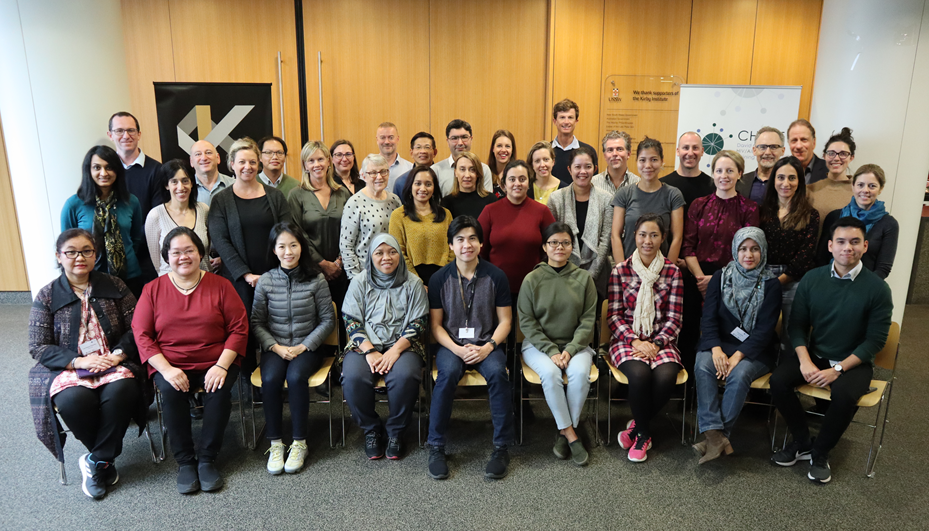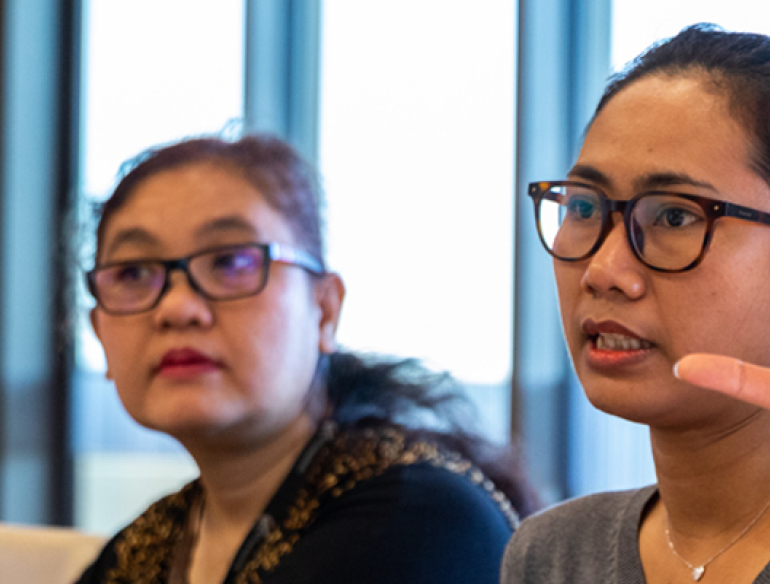Across two weeks in August, the Kirby Institute at UNSW Sydney was delighted to host the first nine participants of the inaugural Cooper HIV/AIDS Research Training (CHART) Program.
The CHART Program is a hands-on education and training initiative, developed by the Kirby Institute, that aims to expand the number of skilled and experienced HIV researchers in the Asia-Pacific region, at the same time as addressing local HIV priorities. The participants travelled from Indonesia, Myanmar, Philippines and South Korea and were selected in a competitive application process. Using the skills learnt through the twelve-month program, they will prepare research reports for national policy makers, as well as manuscripts for publication in peer-reviewed medical journals.
 Participants, lecturers and mentors from the CHART Program.
Participants, lecturers and mentors from the CHART Program.
Australia’s HIV rates have been falling in recent years thanks to a national strategy that has provided universal access to effective treatments and prevention tools, but significant barriers still exist for many countries our region. The Kirby Institute’s approach to health spans a range of disciplines, from the laboratory to public health, and is ideally placed to share knowledge and research expertise within the region.
Professor John Kaldor, who is one of the academic leads of the program, says expanding research skills into the region is the purpose of the CHART program, which was established in the name of our inaugural director, the late Professor David Cooper. “David was dedicated to transferring knowledge and resources around the world, to combat HIV globally,” said Professor Kaldor.
Researchers from across the Kirby Institute shared their research knowledge through a series of workshops over a fortnight, as both teachers and mentors. The workshops took participants through the principles of research, data management and analysis.
“The program draws on the skills and experience of Kirby Institute researchers from a range of disciplines, and career stages,” said Liza Doyle, International Training and Development Manager at the Kirby Institute, who oversees the CHART Program. “It was particularly rewarding to see the level of enthusiasm and engagement from both participants and staff as the participants shared valuable knowledge of the epidemic in their home countries as they prepared their research protocols.”
One of the Kirby Institute researchers involved in the program as both a lecturer and mentor was Dr Stefanie Vaccher, who recently completed her PhD on adherence to HIV pre-exposure prophylaxis (PrEP), a highly effective HIV prevention strategy. “This was the first stats lecture I have given since my PhD was accepted earlier this year, and it was a fantastic experience for me personally being able to share some of the knowledge that I have been fortunate to acquire, and put into play, through completing my thesis,” said Dr Vaccher. “I’m so proud to be involved in this program, and grateful for the opportunity to work with such an impressive group of people from our wider region.”
The Kirby Institute's Dr Stefanie Vaccher (third from left) and Ms Eithandee Aung (far left) with CHART participants.
Professor Kaldor said that it is important to engage and collaborate with other countries in our region, especially those where HIV is still epidemic, and that building the capacity of the local workforce is critical.
“Each country has its own unique set of challenges when it comes to tackling HIV, and no one is more aware of these than the people on the ground,” he said. “I don’t think it’s our role to tell other countries what will work for them, but rather to share our knowledge and experiences about how to do the most relevant research, so that they are equipped and empowered with tools to implement change in their own way. Having met this first round of participants, I’m excited to see how they will shape healthier futures for their communities, and we look forward to welcoming them back in April.”
You can read more about the CHART program here.
Contact
Estelle Jones
